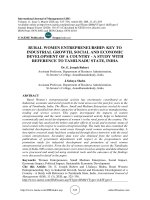Economic growth and economic development 564
Bạn đang xem bản rút gọn của tài liệu. Xem và tải ngay bản đầy đủ của tài liệu tại đây (125.83 KB, 1 trang )
Introduction to Modern Economic Growth
discussed, limit pricing results from process innovations by some firms that
now have access to a better technology than their rivals. Alternatively, it
can also arise when a fringe of potential entrants can imitate the technology
of a firm (either at some cost or with lower efficiency) and the firm may be
forced to set a limit price in order to prevent the fringe from stealing its
customers.
We summarize this discussion in the next proposition:
Proposition 12.1. Consider the above-described industry. Suppose that firm 1
undertakes an innovation reducing marginal cost of production from ψ to λ−1 ψ. If
pM ≤ ψ, then firm 1 sets the unconstrained monopoly price p1 = pM and makes
profits
(12.3)
¡ ¢¡
¢
π
ˆ I1 = D pM pM − λ−1 ψ − µ.
If pM > ψ, firm 1 sets the limit price p1 = ψ and makes profits
(12.4)
π I1 = D (ψ) ψ
λ−1
−µ<π
ˆ I1 .
λ
Proof. The proof of this proposition involves solving for the equilibrium of an
asymmetric cost Bertrand competition game. While this is standard, it is useful to
repeat it, especially to see why in equilibrium, all demand must be met by the low
cost firm. Exercise 12.2 asks you to work through the steps of the proof.
Ô
The fact that
I1 < π I1 is intuitive, since the former refers to the unconstrained
monopoly profits, whereas in the latter, firm 1 is forced to charge a price lower than
the profit-maximizing monopoly price because of the competition by the remaining
firms (still producing at marginal cost ψ).
It can also be easily verified that both π
ˆ I1 and π I1 can be strictly positive, so
that with ex post monopoly innovation becomes possible. This corresponds to a
situation in which we start with pure competition, but one of the firms undertakes
an innovation in order to escape competition and gains ex post monopoly power.
The fact that the ex post monopoly power is important for providing incentives
to undertake innovations is consistent with Schumpeter’s emphasis on the role of
monopoly in generating innovations.
550









